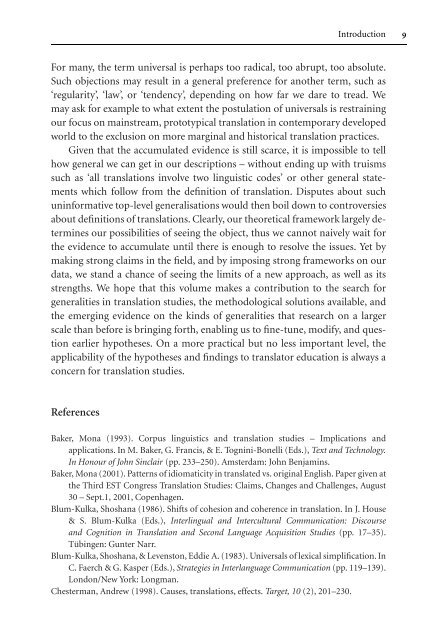Translation Universals.pdf - ymerleksi - home
Translation Universals.pdf - ymerleksi - home
Translation Universals.pdf - ymerleksi - home
You also want an ePaper? Increase the reach of your titles
YUMPU automatically turns print PDFs into web optimized ePapers that Google loves.
Introduction 9<br />
For many, the term universal is perhaps too radical, too abrupt, too absolute.<br />
Such objections may result in a general preference for another term, such as<br />
‘regularity’, ‘law’, or ‘tendency’, depending on how far we dare to tread. We<br />
may ask for example to what extent the postulation of universals is restraining<br />
our focus on mainstream, prototypical translation in contemporary developed<br />
world to the exclusion on more marginal and historical translation practices.<br />
Given that the accumulated evidence is still scarce, it is impossible to tell<br />
how general we can get in our descriptions – without ending up with truisms<br />
such as ‘all translations involve two linguistic codes’ or other general statements<br />
which follow from the definition of translation. Disputes about such<br />
uninformative top-level generalisations would then boil down to controversies<br />
about definitions of translations. Clearly, our theoretical framework largely determines<br />
our possibilities of seeing the object, thus we cannot naively wait for<br />
the evidence to accumulate until there is enough to resolve the issues. Yet by<br />
making strong claims in the field, and by imposing strong frameworks on our<br />
data, we stand a chance of seeing the limits of a new approach, as well as its<br />
strengths. We hope that this volume makes a contribution to the search for<br />
generalities in translation studies, the methodological solutions available, and<br />
the emerging evidence on the kinds of generalities that research on a larger<br />
scale than before is bringing forth, enabling us to fine-tune, modify, and question<br />
earlier hypotheses. On a more practical but no less important level, the<br />
applicability of the hypotheses and findings to translator education is always a<br />
concern for translation studies.<br />
References<br />
Baker, Mona (1993). Corpus linguistics and translation studies – Implications and<br />
applications. In M. Baker, G. Francis, & E. Tognini-Bonelli (Eds.), Text and Technology.<br />
In Honour of John Sinclair (pp. 233–250). Amsterdam: John Benjamins.<br />
Baker, Mona (2001). Patterns of idiomaticity in translated vs. original English. Paper given at<br />
the Third EST Congress <strong>Translation</strong> Studies: Claims, Changes and Challenges, August<br />
30 – Sept.1, 2001, Copenhagen.<br />
Blum-Kulka, Shoshana (1986). Shifts of cohesion and coherence in translation. In J. House<br />
& S. Blum-Kulka (Eds.), Interlingual and Intercultural Communication: Discourse<br />
and Cognition in <strong>Translation</strong> and Second Language Acquisition Studies (pp. 17–35).<br />
Tübingen: Gunter Narr.<br />
Blum-Kulka, Shoshana, & Levenston, Eddie A. (1983). <strong>Universals</strong> of lexical simplification. In<br />
C. Faerch & G. Kasper (Eds.), Strategies in Interlanguage Communication (pp. 119–139).<br />
London/New York: Longman.<br />
Chesterman, Andrew (1998). Causes, translations, effects. Target, 10 (2), 201–230.
















